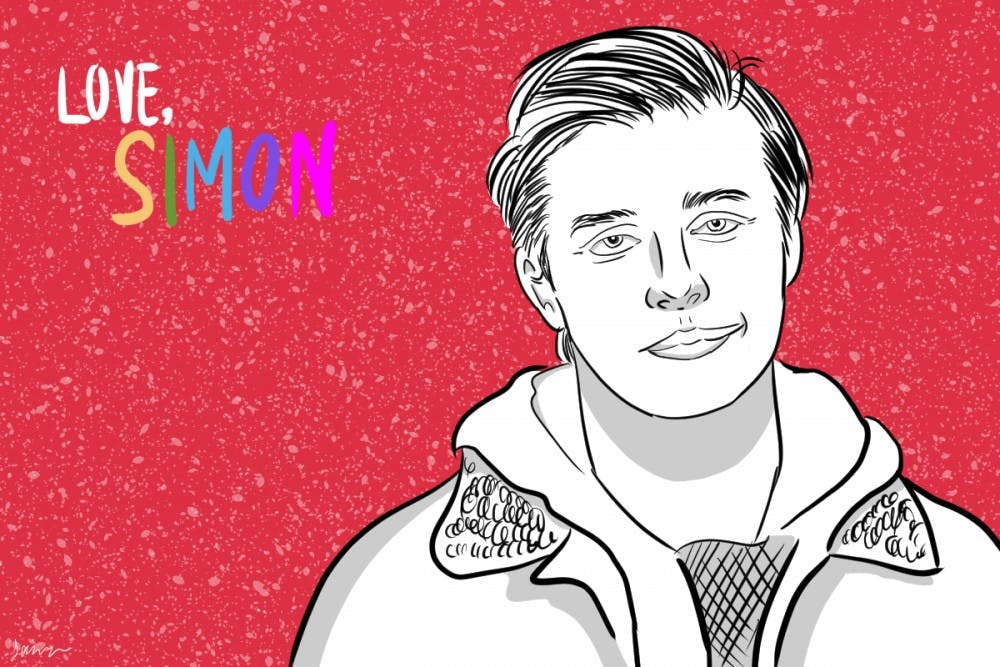Unless you live under a rock, you’ve probably seen your feeds filling with overwhelmingly positive reviews of Love, Simon. No one needs me to tell them that Love, Simon is a good movie. So before I switch things up by delving into this not– completely positive critique, I want to point out that it was major for the LGBTQ community. Seeing queer teens be normal, awkward, and lonely is IMPORTANT. Humanizing us in that context is vital, and that’s what Love, Simon did.
But alas, no movie can be perfect, and Love, Simon is no exception.
For starters, there were several missed chances to explore queerness in society on a deeper level. I found the movie a little…shallow. Simon is supposed to be a normal kid “except [he] has this one huge secret.” The concept of “normal–ness” is flawed on a fundamental level; it perpetuates the idea that being gay is an abnormality. That isn’t the message our queer youth need. Quite the opposite, actually. That message, in the form of a voiceover, seems to directly conflict with what the film aimed to do.
Then there’s Abby, who, honestly, confuses me as a character. She makes comments about how, at her old school, conflicts were settled with knife fights—it seemed like that was meant to code her coming from a poorer background. The odd thing is that when we see Simon pick her up before school, she comes out of the double doors of this GIGANTIC house. Poor–kid–inexplicably–living–in–a–huge–house cliche. This was a major missed opportunity to explore poverty in high school, or at the very least, take a deeper dive into how poverty shapes families and how families shape people.
While we’re talking about Abby, let’s talk about all of Simon’s friends. I want to say that they suck. They really suck. I’m not sure what was being aimed for with their reaction. If the goal was to demonstrate how hard coming out is regardless of who you’re coming out to, the meaning got completely muddled. It almost seems as though the movie wants us to think that the three of them are justified in completely abandoning Simon.
And all of that is supposed to be solved by some smiles and an invite to the carnival? Stop. No. Their reaction wasn’t justified at all. Simon was in an impossible situation. Having someone out you to the entirety of your school is WAY worse than any embarrassing secret. Being outed can ruin someone’s life. That happening on terms that aren’t your own is horrifying.
His friends, people who are supposed to love and support him, shouldn’t have abandoned him that way. They should have sought understanding. We see Simon SO angry and lonely, and on some level we’re supposed to believe he deserves that? I think the hell not. I would have done the same exact things in his position, and the movie does a criminally bad job showing us that the way his friends reacted wasn’t okay.
The way the film chose to resolve that conflict makes light of the entire situation. They completely shunned him for days and they don’t even have a full–fledged conversation about it. The message that this sends to queer youth isn’t positive. Simon was the one who needed to forgive them, not the other way around.
Speaking of the wrong message, why did Leah have to be in love with Simon? It was a completely unnecessary plot point that served only to play into some harmful stereotypes. It is not a queer person’s responsibility to know when their straight friends are catching feelings. It’s just not.
Leah is being incredibly inconsiderate by blaming Simon for HER feelings. It’s emotionally abusive to make someone responsible for your feelings in that way. She had a right to take distance if she needed it, but she didn’t have a right to blame Simon for things he had no control over. The message here seems to just discourage people from forming meaningful emotional bonds with non–queer folks. Honestly, we gays are scared enough of that happening already for it to be reinforced in film form.
The last thing that left a bad taste in my mouth was the ending. The gay kiss was cute. I’m not going to tell you it wasn’t. The issue, though, was that it had to happen in front of a huge crowd of people. It made gayness performative in an extremely uncomfortable way. Being out in high school, and I know this first–hand, is actually so incredibly terrifying. Your relationship becomes a spectacle. Straight people think that they have a right to our narratives. They think that our lives are novelties meant for their entertainment and consumption.
All this being said, I didn’t dislike Love, Simon. It was a good movie that did as many things right as it did wrong. And the mere fact that it exists opens the door for other creatives with more diverse perspectives, to do a better job with all of these issues. I’m hoping Love, Simon is a start to something bigger.

